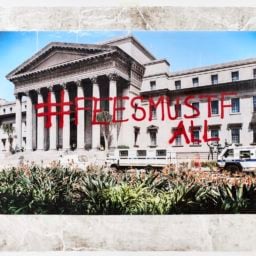A statue of British industrialist Cecil Rhodes has been removed from the University of Cape Town (UCT), amid protesters who cheered and defaced the controversial statue. The statue has been labeled a symbol of British colonialism in South Africa by UCT students, and has attracted mounting protests of late. (See more artnet News coverage of controversial statues with Patriotic Ukrainians Tear Down Lenin Statue, South Africa Has Removed Rabbit From Nelson Mandela Sculpture’s Ear, and Hans Haacke Fourth Plinth Gift Horse: Is This Propaganda We Can All Agree With?)
The BBC reports that the protests started in March after an activist, Chumani Maxwele, smeared excrement on the statue as a protest. The campaign started a slogan called “Rhodes Must Fall.” The decision to remove the statue came after the university’s 30-member council voted on April 8 for its removal.
“It marks a significant… shift where the country deals with its ugly past in a positive and constructive way,” Sandile Memela, spokesman for the arts and culture ministry, told reported AFP.
Student Representative Council head Ramahiba Mahapha, told the BBC that the statue was “a symbol of institutional racism.”
Rhodes, a British businessman, was the founder of the De Beers diamond company and colonizer of South Africa; Rhodes University is named after him, and the prestigious Rhodes Scholarship is controlled by his estate. The University of Cape Town was built on land donated by Rhodes, and the statue was erected in 1934.
More Protests Around South African Statues
The statue’s removal has sparked several protests around other South African statues that have ties to its colonial past, including historical figures like former South African president Paul Kruger and settler Jan van Riebeeck. However, these actions have been met with equal discontent by Afrikaner civil-rights groups.
“The Afrikaner is—from a historical perspective—increasingly being portrayed as criminals and land thieves,” AfriForum said in a statement. “If the heritage of the Afrikaner is not important to government, our youth members will preserve our own heritage.”
Afrikaners are an ethnic group in South African who descend mainly Dutch settlers from the 17th and 18th centuries.
Memela told the AFP that the government does not encourage the violent removal of statues, and would host “a consultative conference in the next few weeks where the country can adopt an official position” on statues and other colonial symbols.








